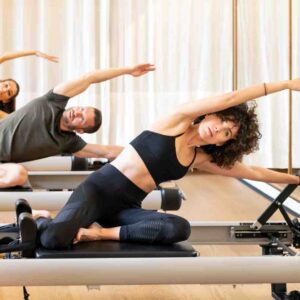Table of Contents
Introduction
Increased Mobility
Improved Core Stability
Injury Prevention and Better Posture
Q&A
Conclusion
"Pilates strengthens body and mind."
Introduction
Pilates improves posture, core strength, and flexibility. It is a low-impact workout for all fitness levels. Pilates improves balance, stress, and body awareness. It also heals injuries and boosts sports performance.
Increased Mobility
Pilates is growing popularity. This low-impact workout targets core strength, posture, and flexibility. Pilates can be done at home or in a studio with a trainer.
Pilates improves mobility and flexibility. Pilates stretches and lengthens muscles, increasing flexibility over time. This helps persons with tight muscles or reduced motion from injury or illness.
Pilates routines stretch muscles slowly and safely. The activities target specific muscle groups to increase flexibility and range of motion. The Pilates spine stretch improves spinal mobility by stretching back muscles.
Flexibility and range of motion improve health. It improves posture, balance, and injury prevention during exercise. It can also alleviate muscle tension and stiffness, improving sleep and stress.
Pilates also improves mental wellness. Slow, controlled motions can be contemplative and relieve tension and anxiety. Pilates breathing can promote awareness and relaxation.
Pilates can enhance flexibility and range of motion, but there are certain factors to consider. First, get a skilled instructor to help you complete the exercises correctly. This prevents injuries and maximises workout benefits.
Start slowly and progressively increase workout intensity. Pilates is low-impact but tough for novices. Starting with fundamental workouts and progressing to more complex ones can prevent injury and assure progress.
Finally, listen to your body and take rests. Stop and rest if Pilates hurts. Pushing through pain might cause injury and setbacks.
Finally, Pilates improves flexibility and range of motion. Slow, controlled movements stretch and lengthen muscles, improving health. To avoid injury and assure success, start carefully with a competent Pilates instructor. Pilates offers lifelong benefits with frequent practise.
Improved Core Stability
Pilates is growing popularity. This low-impact workout strengthens core muscles, improves flexibility, and raises body awareness. Pilates offers several benefits that make it a good choice for people of all ages and fitness levels.
Pilates strengthens your core. Core muscles support the spine and pelvis, ensuring appropriate posture and balance. Pilates strengthens and tones these muscles over time.
Pilates builds core strength and stability. This improves posture, back pain, and physical performance. As you age, strong core muscles support your spine and prevent injuries.
Pilates improves flexibility. Pilates stretches and lengthens muscles, improving range of motion and reducing injury risk. Pilates routinely improves muscle flexibility and performance.
Pilates improves balance, coordination, and core strength. Pilates exercises that involve a solid core while moving your limbs can improve balance and coordination over time. This can benefit older persons who are at risk for falls and other balance-related ailments.
Pilates reduces stress and improves mental wellness. Pilates' slow, controlled motions can relieve stress and improve mental health. Pilates can also help ADHD sufferers focus and concentrate.
Pilates provides several physical and mental health benefits. Pilates helps increase core strength, flexibility, balance, and mental health. Pilates can improve your life if you practise regularly. Why not try Pilates and see if it helps?
Injury Prevention and Better Posture
Pilates is growing popularity. This low-impact workout strengthens core muscles, improves flexibility, and raises body awareness. Pilates improves physical and mental wellness for all ages and fitness levels.
Pilates reduces injury risk. Pilates is low-impact and easy on the joints. Controlled movements and appropriate form prevent strains and sprains. Pilates strengthens joint muscles, preventing injuries.
Pilates also improves posture. Poor posture causes back, neck, and headaches. Pilates strengthens spine-supporting muscles, improving posture and reducing risk. Pilates emphasises optimal alignment and body awareness, helping you maintain good posture throughout the day.
Pilates can also improve mental wellness. Controlled movements and breathing can alleviate stress and relax. Pilates improves bodily awareness and mindfulness, which reduces worry and boosts well-being.
There are certain things to consider before attempting Pilates. First, hire a skilled instructor to teach you the exercises and ensure appropriate form. Reformers, Cadillacs, and mats can be used for Pilates. Your teacher can help you choose based on your fitness level and goals.
Start cautiously and increase workout intensity. Pilates is low-impact but tough, especially for beginners. Listen to your body and avoid overexertion to avoid damage.
Pilates has several physical and mental health benefits. It improves posture, reduces injury risk, and promotes calm and mindfulness. To avoid injury, start gently with a competent Pilates instructor. Pilates regularly strengthens, heals, and balances the body and mind.

Q&A
1. How is Pilates beneficial?
Pilates improves flexibility, balance, posture, and core strength.
2. How does Pilates help?
Answer: Pilates improves muscle tone, vitality, stress, and mental health.
3. Does Pilates burn fat?
Answer: When combined with a healthy diet and regular exercise, Pilates can help you lose weight by improving muscle tone and metabolism.
Conclusion
Pilates boosts flexibility, strength, balance, and posture. It reduces tension and back discomfort. Pilates improves fitness and well-being.


